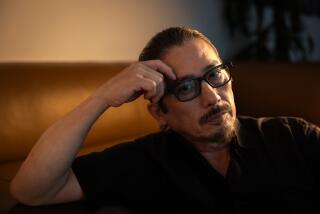Japanese Right Praises Film on WWII Leader
- Share via
TOKYO — In a gesture likely to trigger fresh acrimony between Japan and its Asian neighbors, 27 conservative lawmakers from Japan’s ruling Liberal Democratic Party on Monday warmly endorsed a controversial new movie about Gen. Hideki Tojo, the infamous Japanese prime minister who was tried and executed as a war criminal after World War II.
Japanese and foreign critics say the feature film, “Pride: A Fateful Moment,” scheduled to open here May 23, glorifies Tojo and portrays the brutal Japanese invasion of Asia as a just campaign by Japan to liberate its oppressed Asian neighbors from Western colonial rule.
“Hideki Tojo was the chief criminal of that war of aggression,” Chinese Foreign Ministry spokesman Zhu Bangzao said Saturday. “We feel shocked and indignant over the fact that some people in Japan produced such a movie to whitewash aggression.” North Korea also condemned the film with vitriol.
Still, the guest list for Monday’s screening of Toei Studio’s $11-million, 161-minute epic read like a “Who’s Who” of the LDP’s right wing. Seven of the lawmakers--including three former Cabinet ministers and the son of one of the “Class A” war criminals executed with Tojo--held a post-screening news conference to endorse the filmmakers’ view that the Tokyo war crimes trials, conducted by the Allies after Japan’s surrender, were grossly unfair, a mere vehicle for imposing the victors’ predetermined judgments upon the vanquished.
Lawmaker Masahiro Koga claimed that he could not say whether atrocities were committed at Nanjing, where the Chinese say 300,000 men, women and children were massacred by Japanese soldiers. “The most important thing is to recognize that there are a lot of different interpretations of history,” Koga asserted.
Another LDP member, Kenzo Yoneda, 49, said the Tokyo war crimes tribunal, which concluded in 1948, should be reconvened in an unbiased, international court. “Japan was made out to be the only villain in the war,” he said, but blame should be apportioned among both the Japanese and the Allies. He and other lawmakers suggested that the U.S. firebombing of Tokyo and atomic bombing of Hiroshima and Nagasaki should also be treated as war crimes.
As for Tojo, he attempted suicide but eventually was hanged in 1948 after his conviction by an international tribunal that found him to be the architect of the brutal Japanese wartime campaign, particularly in Southeast Asia and China.
Tojo was said to have personally approved Japan’s surprise bombing of Pearl Harbor and was seen as the chief force in ensuring that the Japanese joined the Axis forces, coordinating their attempts at global control with Nazi Germany and Fascist Italy.
Repeated episodes in which Japanese officials have tried to minimize or deny Japan’s wartime misdeeds have outraged the Chinese, Koreans and other Asians for decades.
But recently, beleaguered Prime Minister Ryutaro Hashimoto has taken pains to try to mend fences. Last year, he toured a war museum in Manchuria, the region of northeastern China that was once a Japanese colony, and apologized for the pain Japan had caused there.
*
And just last week, senior LDP official Hiromu Nonaka was sent on an unprecedented mission to Nanjing, where he expressed remorse and laid a wreath at a memorial to the massacre victims.
This act was particularly symbolic because the Japanese right claims that the victims were mostly soldiers in civilian clothing and the alleged death toll vastly overstated.
But Nonaka’s gesture was quickly countered Monday by LDP member Seisuke Okuno, who called the Nanjing massacre “a political creation.”
This ideological rupture within Japan’s ruling party is symbolic of a growing nationwide battle between liberals, who are trying to force their government to admit and atone fully for wartime atrocities, and conservatives, who say that Japan has apologized enough for much-exaggerated misdeeds.
The conservative backlash appears to be gaining ground of late by insisting that 50 years after the war crimes trials concluded, Japan should shed its “brainwashed” and “masochistic” Allied-imposed view of history.
The chief sponsor of “Pride” was Higashi Nihon Housing Co., whose president, Isao Nakamura, has reportedly been outspoken in calling for Japan to give its children a version of their history that will reinstill national pride.
Yuko Iwanami, Tojo’s granddaughter, who believes her notorious ancestor has been unfairly lumped together with Adolf Hitler and Benito Mussolini as a symbol of pure evil, has been an energetic backer of the film.
*
The popular actor Masahiko Tsugawa, who starred in films by the late director Juzo Itami and now turns in a brilliantly sympathetic performance as a tormented yet unbowed, honorable and grandfatherly Tojo, has also been stumping for the movie and its ideology.
Tsugawa said charges that the film glorifies Tojo are based on a “simplistic” interpretation of a complex character. He said he is delighted by the debate and the international furor, which he called “great publicity for the movie.”
Toei executives say they hope to release the picture in the U.S.
But “Pride” could spark anti-Japanese prejudice among some U.S. audiences. The film’s length, its schmaltz, its omission of any mention of Tojo’s mistreatment of Allied prisoners of war and its portrayal of the American chief war crimes prosecutor as a vengeful bungler who fails to produce any real evidence against Tojo might make it a hard sell in Yankee territory.
The loudest objections to the movie, however, have come from Toei’s own labor union, which organized a denunciation of “Pride” by 305 Japanese film luminaries, intellectuals, unionists and liberals.
“This movie glorifies Japan’s war of invasion and exonerates Hideki Tojo,” said Masayuki Kawachi, chairman of the Toei Labor Union Committee. Moreover, it is likely to trigger foreign antagonism, Kawachi said. “In the short-term, the studio could make a lot of money, but in the long run, it will be damaging,” he said.
More to Read
Sign up for Essential California
The most important California stories and recommendations in your inbox every morning.
You may occasionally receive promotional content from the Los Angeles Times.













